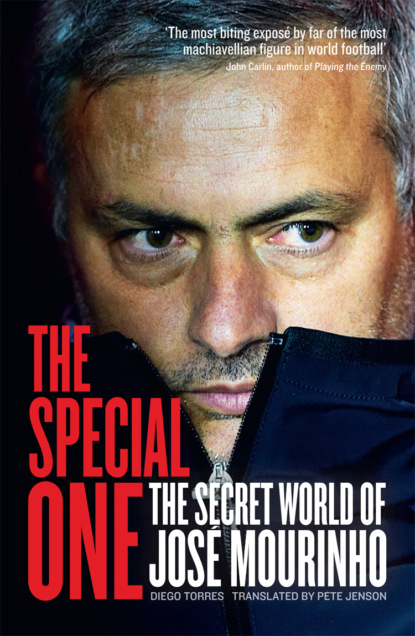По всем вопросам обращайтесь на: info@litportal.ru
(©) 2003-2024.
✖
The Special One: The Dark Side of Jose Mourinho
Настройки чтения
Размер шрифта
Высота строк
Поля
For young Iborra the astonishment was clear. He had grown up in a club in administration and could not conceive of being so passionate about anything other than keeping his job. Barcelona, in any case, pulled away from the field in the 2010–11 season. Perhaps because of the strains of competition and the tensions thereby generated, the breaking of the code of co-existence between the two teams seriously threatened to destroy the majestic image that Real Madrid had maintained for over a century.
Chapter 5
Humiliation (#uf262fc09-2ee0-5f85-99b0-0ea07150a3f7)
‘Machiavelli says that whosoever wants to cheat, will find somebody who allows themselves to be cheated, proving that if there are no more lies, it is not for want of somebody who would believe them, but for the difficulty of finding he who is resolved to lie.’
Lucio V. Mansilla, An Expedition to the Ranquel Indians
Sunday 28 November 2010, and staying in the hotel Rey Juan Carlos on the Avenida Diagonal in Barcelona is a true believer, a man of unshakeable conviction. A native of Vitoria, pale skinned, with a prominent nose and wavy hair, the man is pleased to be where he is, in this uniform, with this badge, and following the orders of a visionary leader. Aitor Karanka believes in José Mourinho.
The assistant seemed animated by a childlike excitement. With his contralto voice conveying a devout enthusiasm, he confessed his faith to all those on the trip – at the airport, on the bus, in the dining room, in the meeting room, in the glass elevator of the giant hotel hall, as the hours passed that would lead inexorably to the Camp Nou.
‘We’re going to give them a footballing lesson,’ Karanka repeated to his listeners. ‘We’re going to give them a footballing lesson.’
The passion of Mourinho’s assistant contrasted with the scepticism among the Spanish players when the coach met them at 11.00 a.m. on the 29th to give the team-talk before the first clásico of the season. The coach was displaying all his usual self-confidence – the body language, the seductive poses – conscious that his talk was merely a way of getting his own players on his side, infusing them with the same mixture of pleasure and fear as in an initiation ritual. One of them joked, ‘He thinks he’s George Clooney!’ While the meeting was going on, nobody spoke. No one commented or questioned anything as Mourinho told them how they were going to ambush Barcelona.
Mourinho asked them to press in what he called ‘low-block’, except at those times when they would go higher up the pitch, pressing in ‘medium-block’ at goal-kicks, throw-ins and attacking corners. He reminded them to maintain ‘medium-block’ only while Barcelona were trying to play the first and second pass. On the third pass they were told to return to their own half. To bear out this approach he showed them a video of a recent game between Barcelona and Villarreal that Barça won 3–1, in which Villarreal could be seen pressing their rivals in their half, trying to ensure that the periods of possession enjoyed by Xavi and the others were short and uncomfortable. The players recall Mourinho being absolutely certain that he had the answer and citing Villarreal as an example of exactly what not to do: ‘Maybe Barcelona think we’re going to press them high up the pitch like those fools from Villarreal …’
For Mourinho, the fundamentals of ‘pressing’ came from the principles – and with the terminology – of Victor Frade, retired Professor at the University of Porto and Director of Methodology at FC Porto. Frade was known by coaches across Europe for creating the ‘tactical periodisation’ method, which took over in importance from the methodologies that had previously dominated team sports until the 90s. Pioneers such as Frade in Portugal and Paco Seirul-lo in Spain concentrated their training session on playing with a ball, dispensing with linear-based, non-ball-playing exercises derived from athletics. The new theorists such as Frade argued that players only get better if you invite them to solve complex problems during a game situation, and not when they are just repeating a mechanical formula on a piece of apparatus. As a coach and driver of this new trend, Juanma Lillo said, ‘If there’s one thing that’s not linear it’s a human being.’
Guardiola and Mourinho drank from the same theoretical spring but their methods were quite different. Guardiola was a virtuoso when it came to organising the attack and defence to the point where they harmonised, as if there were a wholly natural transition between the two. Mourinho’s talent, by contrast, lay in building defensive models. Guardiola built his defence on the way his team organised themselves with the ball; Mourinho built his attack on the way his teams defended. Pressing can be understood as a collective, synchronised movement to win back the ball. It is a defensive exercise that can also be used as an offensive tool if applied in the right places and at the right times.
Вы ознакомились с фрагментом книги.
Приобретайте полный текст книги у нашего партнера:
Приобретайте полный текст книги у нашего партнера:





